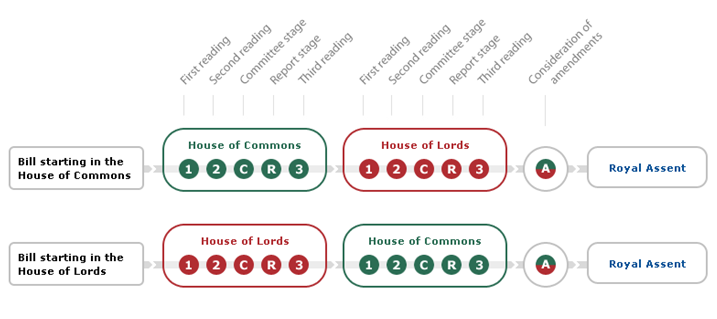The UK Parliament
Parliament
The Houses of Parliament is the main legislative body of the United Kingdom. It has two chambers: the House of Commons, made of up elected Members of Parliament (MPs); and the House of Lords, made up of appointed members. Legislation must be passed in both Houses to pass into law.
Parliament has three main responsibilities:
- It scrutinises the work of government by examining policies and holding ministers to account. Members do this by asking questions, either orally or in writing, of ministers (for example at Prime Minister’s Questions every Wednesday); through debates in the Houses; and through committees, which are smaller groups of MPs and/or Lords which consider specific policy issues or legislation in detail.
- It debates the issues of the day and passes legislation (laws)
- The House of Commons holds the power to set and raise taxes
Although the government (usually made up of the party or coalition of parties who secures an overall majority or the largest minority of seats in the House of Commons) exercises executive power, leads the civil service, and sets the direction of national policy, the government must retain confidence of a majority of votes in the House of Commons, and all legislation must be passed by Parliament. You can find more about the functions and organisation of Parliament here.
The House of Commons and MPs
Everyone in the UK is represented by an elected Member of Parliament (MP). The UK is currently divided into 650 areas called parliamentary constituencies, each of which is represented by one MP in the House of Commons. An MP’s role is to consider and propose new laws, to question government ministers about current issues and laws, and to represent the views of their constituents.
MPs split their time between working in the House of Commons, working in the constituency that elected them and working for their political party. Some MPs from the governing party (or parties) become government ministers with specific responsibilities in certain areas. Some MPs are also members of committees, which look at policy issues in detail.
The House of Lords and its Members
The House of Lords is the second chamber of the UK Parliament. It is separate and independent from the House of Commons, and unlike the Commons, members are appointed rather than elected. The Lords shares the task of making and shaping laws and checking and challenging the work of the government.
The Lords has three main roles:
- Making laws
- In-depth consideration of public policy
- Holding government to account.
Both Houses must agree on a Bill before it can become law, although the Lords has a limited say on financial bills. The Lords can delay Bills and make the Commons to reconsider its decisions. In this capacity, the Lords acts as a check on the House of Commons that is independent from the electoral process. The Lords can also introduce Bills, although this is less common.
Unlike the Commons, there is no fixed limit on the number of Members of the House of Lords (currently, there are around 825). Members are generally appointed life peers who have distinguished themselves within their field through long service or exceptional achievement. In addition, there are 26 Lords Spiritual, who are senior Church of England bishops and archbishops, and 92 hereditary peers. Much of the members’ work takes place in Select Committees, where their considerable individual expertise enables more in-depth investigation of specific public policy issues. There are currently five permanent Lords committees which consider policy on Europe, science, economics, communications, and UK constitutional reform. You can find more information on the work of the Lords here.
How does a policy become a law?
What is public policy?
Most legislation concerns matters of ‘public’ policy. Public policy means the agreed principles or ideas guiding how a government entity or its representatives acts in relation to specific public issues, which may be social, economic, or political.
Good public policy is consistent with national law and international customs, effective and efficient, robust, and principled. However, this is difficult to achieve.
How is public policy developed?
The development process is not linear, but a continuous set of feedback loops. Verification and evaluation are essential to the functioning of this system.
Making good policy is challenging. Public policy arises out of a fluid mixture of departmental advice to ministers, political advice from special advisors, top-down directions from Cabinet or the minister based on the governing party/parties’ goals and election commitments, pressure from lobbyists and special interest groups, and, occasionally, in response to direct public pressure. Most policies that make it into legislation, therefore, are compromises negotiated between the various actors.
When a government department is considering a new policy, often it will release a consultation document called a ‘Green Paper’. This will be published on departmental websites, and is aimed at encouraging debate and feedback from other departments, MPs, and members of the public. A Green Paper is often the first step towards introducing a Bill into Parliament.
Following the publication and discussion of the Green Paper, the department may release a White Paper, which will also be published on departmental websites. This is a more detailed and formalised version of the Green Paper, and often forms the basis for a Bill to be introduced to Parliament. If the government believes there is an urgent need for particular legislation, or wishes to limit opportunities for consultation, the department may publish a White Paper first, without publishing a Green Paper. Government is not obliged to produce Green or White Papers, and in some cases a Bill may be introduced to Parliament without any public consultation steps.
Parliamentary stages of a Bill
Bills can be introduced into either the Commons or the Lords, and each Bill goes through set stages of legislation in each House. The Bill must be approved by both Houses before it receives Royal Assent, after which it becomes an Act of Parliament.

Image copyright of parliament.uk
First Reading
The first reading is a formality and marks the presentation of the bill in Parliament. The text of the bill and any explanatory notes will be published at this time.
|
Second reading – Commons |
Second reading - Lords |
|
MPs debate the general principles of the Bill. This is the opportunity to express significant areas of concern. A vote is taken at the end of second reading; if successful, the Bill proceeds to Committee stage. |
Members debate the general principles of the Bill. Unlike the Commons, there is no vote – the Bill proceeds directly to Committee stage. |
|
Committee stage - Commons The principal stage for detailed scrutiny and amendment of the Bill. In the Commons, this is conducted by a Public Bill Committee which may have 16-50 members. The composition of the committee is roughly proportional to that of the House itself, so it is rare that amendments are accepted that are contrary to a majority government's wishes. |
Committee stage – Lords In the Lords, Bills are usually considered by a Committee of the Whole House. This means that any member can participate in Committee Stage, and all amendments that are tabled can be debated. There is no time limit set on how long the Stage can last, unlike in the Commons. |
|
Report Stage This is a further opportunity for the House to consider amendments made in Committee and to amend the Bill. |
|
|
Third reading – Commons This usually happens immediately after Report Stage. This is the final chance for the House to consider whether it wishes the Bill as a whole to proceed. A vote is taken. The scope for amendments is limited at this stage |
Third reading – Lords Unlike the House of Commons, amendments can be made at third reading in the House of Lords, provided the issue has not been fully considered and voted on during either committee or report stage. |
Transmission to the Lords (or to the Commons, for those bills starting life in the Lords)
When a Bill has passed through third reading in both Houses it is returned to the first House (where it started) for any amendments made by the second House to be considered. If the Commons makes amendments to the Bill, the Lords must consider them and either agree or disagree to the amendments or make alternative proposals. If the Lords disagrees with any Commons amendments, or makes alternative proposals, then the Bill is sent back to the Commons. A Bill may go back and forth between each House until both Houses reach agreement on the exact wording – this is known as ‘ping pong’.
Bill receives Royal Assent (becomes an Act)
Select Committees
Select Committees work in both Houses, and their role is to check the work of government and to consider policy issues. Committees often seek evidence from members of the public, including academics and other experts. The results of these inquiries are public and may require a response from government.
Select Committees in the House of Commons are made up of backbench MPs (i.e. those who do not hold ministerial roles). House of Commons committees mostly examine the work of government departments and government expediture. There are currently 26 Commons committees: one for each government department, as well as additional committees with cross-departmental or procedural remits (for example the Public Administration and Constitutional Affairs Committee). Committee members represent all parties in the House according to proportion of seats they hold, and their chairs are elected by the whole House.
Select Committees in the House of Lords do not scrutinise the work of government departments, instead focussing in depth on specialist subjects and policy issues. This is because they typically have more time and specific expertise available. There are currently five major Lords' Select Committees, which address topics relating to Europe, science, economics, communications and the UK constitution.
Here you can find a list of existing Select Committees and current inquiries in both Houses.
All-party Parliamentary Groups
All-party Parliamentary Groups (APGs) are informal groups of MPs and members of the House of Lords from all parties that meet to discuss and research areas of common interest. A register of all APGs can be found on Parliament’s website here. Generally, subject groups meet relating to a particular topic (e.g. forestry) and country groups meet relating to a particular country or region.
The Engaging with Parliament guide provides advice and information about engaging with Parliament, whether through working with an MP or Member of the House of Lords, or by contributing to a Select Committee or APG



